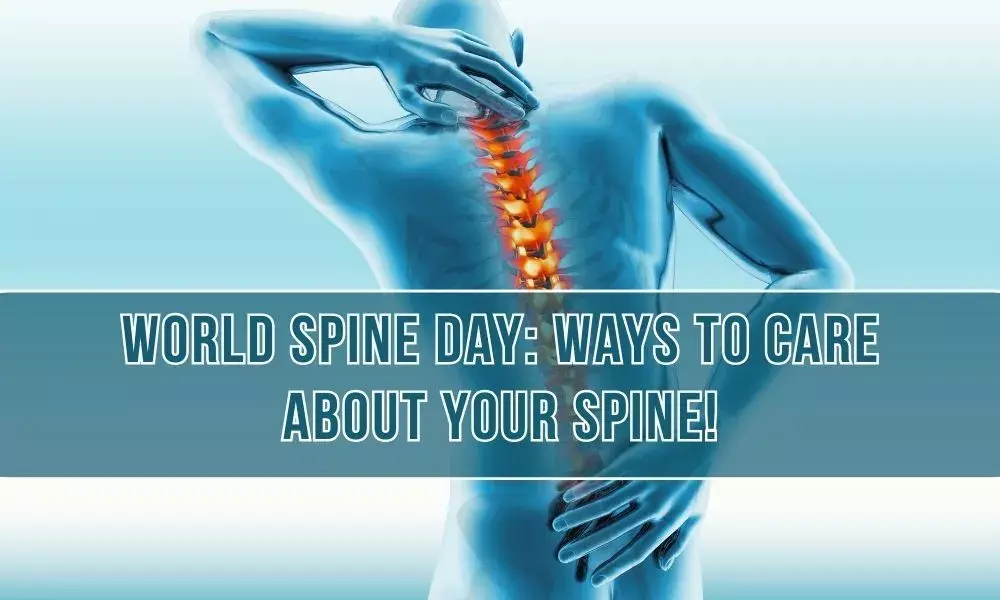The spine is an integral part of the human body as it is our body’s central support structure.
October 16th is observed as World Spine Day to spread awareness about the significance of the spine and educate people about taking care of their spine.
Our Spine plays a crucial role in our well-being through below ways:
-
It primarily gives structural support to our body to maintain posture and stand upright.
-
Our spine allows us to sit, stand, bend, walk, and twist.
-
It protects the spinal cord, a vital part of our central nervous system.
-
The spine’s flexibility and numerous joints allow various motions in different directions.
The slightest problem in the spine can disturb the posture and make it difficult for us to perform basic functions, which is why maintaining spinal health is paramount. Some of the common spinal issues seen in humans include:
-
Herniated discs are a condition that occurs when the cushioning discs between the vertebrae rupture.
-
Spinal stenosis occurs due to the narrowing of the spinal canal, causing pressure on the spinal cord.
-
Degenerative disc disease, wearing down of discs between vertebrae, causing pain and hindered mobility.
-
Scoliosis refers to curvature of the spine, which can be congenital or develop while growing older.
-
Osteoarthritis happens when the spine’s protective cartilage wears down, resulting in pain and stiffness.
These conditions typically arise due to ageing, poor posture, obesity, and genetic reasons. To ensure spinal health, one can do various things to keep their spine healthy.
-
Regular exercise is important: Since modern lifestyles have become increasingly sedentary, body movement has become rare and optional. Any amount of it will work if you are just getting started. Being physically active will keep spinal problems at bay. Indulge in exercises like swimming, walking, and core-strengthening exercises.
-
Maintain a healthy weight: Excess weight can strain the spine, so one must strive to maintain a healthy weight through regular exercise and a balanced diet. A healthy weight helps in reducing the strain on the spine.
-
Ergonomics: Ensure your workspace and home are ergonomically designed to support a healthy spine. Proper ergonomics, especially when sitting, is crucial.
-
Lift properly: When lifting heavy objects, use legs, not the back, to minimize the risk of injury. This can help manage back pain. While lifting something heavy, one must bend knees and keep back straight. This way, our leg muscles will do most of the work. One must bend knees and squat down towards the object, keep it close to the body, and straighten legs to lift. Never lift a heavy object above shoulder level. Avoid turning or twisting body while lifting or holding a heavy object.
-
Good posture: Whether sitting, standing, or walking, maintaining proper posture reduces the strain on your spine and helps prevent long-term issues.
-
A balanced diet rich in calcium and vitamin D is important for bone health.
-
Stay active: Regular exercise can help strengthen the muscles supporting our spine. Activities like swimming, yoga, and core exercises are particularly beneficial. The easiest way to keep a spine strong is to keep our spine moving.
-
Stay hydrated: Drink plenty of water to keep spinal discs properly hydrated.
-
Stretch and relax: Incorporate stretching and relaxation techniques to reduce muscle tension and stress on the spine.
-
Sleep right: Use a supportive mattress and pillow to maintain proper spinal alignment.
-
Quit smoking: Smoking can affect blood flow to the spine and hinder the body’s healing ability. Putting a halt to smoking can help improve blood flow and reduce the risk of spine-related issues.
The Bottom Line
Regular check-ups with a bone specialist are advisable to monitor spinal health and address emerging concerns. Seeking early medical attention for persistent back pain or signs of potential spinal issues can aid in timely diagnosis and appropriate management.
Moreover, consulting a physiotherapist or healthcare provider for a customized exercise routine that caters to individual needs and conditions can be highly beneficial. Being proactive and informed about spine health and taking appropriate preventive measures is key to leading a healthy and active life.





